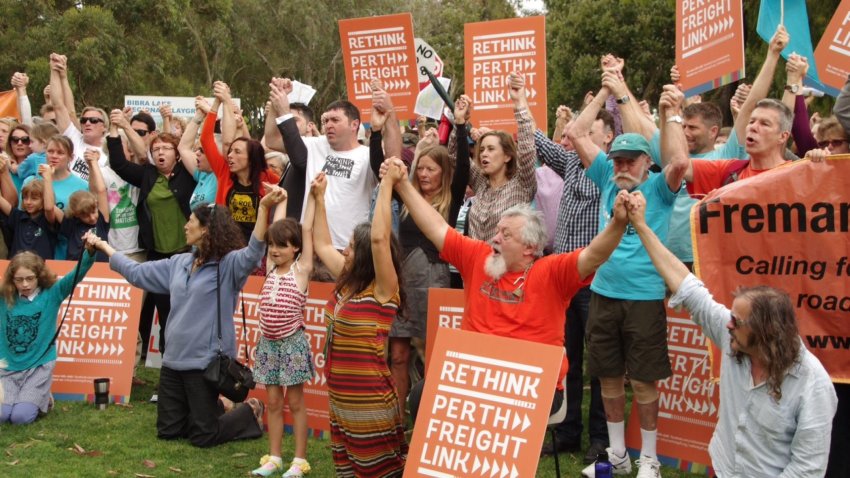
Two important issues facing residents in Fremantle and its surrounds are the proposed Roe 8 highway extension and new container facility at Kwinana Outer Harbour.
Initially proposed as a freight route to deal with rising traffic congestion around Fremantle harbour, Roe 8 was scuttled in 2017 following mass community protest. The proposed $450 million extension to Stock Road was set to cut through the ecologically valuable Beeliar Wetlands.
The Coalition opposition has put the proposal back on the table in recent months, with many believing it could become a key issue in the lead up to the 2021 state elections.
In the meantime, the state Labor government’s Westport task force is proposing to instead build another container terminal south of Fremantle to deal with the problem.
However, the new port facility proposed for Kwinana Outer Harbour poses grave threats to the biological diversity and water quality of Cockburn Sound, which is home to little penguins, bottlenose dolphins and pink snapper.
Green Left Weekly’s Janet Parker spoke to four progressive candidates contesting council elections in the region as part of Western Australia’s October 19 local council elections about these two issues.
The four candidates Parker spoke to were: for the City of Fremantle, Lynn Maclaren (Hilton Ward), Jon Strachan (South Ward) and Chris Jenkins (Beaconsfield Ward); and Phoebe Corke, who is running for West Ward in the City of Cockburn.
What's your view on the push for building Roe 8 and a new port facility at Kwinana Outer Harbour?
LM: Congestion is a time-waster and causes great frustration, so I can understand why some folks are calling for traffic to be reduced on Leach and South streets. The big lie is that Roe Highway stage 8, through the Beeliar Wetlands, is going to solve all our problems.
It would ruin a culturally treasured area that we want to retain as a much-loved recreational park with wild spaces and valued biodiversity. The impact on congestion would be short-lived and long-term problems would be left unsolved at great cost to us.
I want to retain a limited-scale working port in Fremantle. I’ve visited several cities overseas that have retained ports: we can, too. We should also progress the development of another port. Many studies have been done and I want to review their findings for the best way forward.
I support a collaborative approach to finding a solution to port development.
JS: I’m not supportive of either.
Fremantle is the port and the port is Fremantle. From a purely heritage and emotive standpoint I do not support the proposal.
In practical terms, shifting the major port for Metro WA from Fremantle to Kwinana would undermine Fremantle as a Strategic Regional Centre, as nominated in Directions 2031.
I also think the environmental damage caused by building a new port in Cockburn Sound is being understated. I understand that the port side infrastructure can continue to function well into the future with predicted freight. The issue is with the land-backed stress caused by freight logistics to and from the port.
If the port does move to Cockburn Sound, there will be no long-term need for Roe 8. Even with a continuing container port in Fremantle, Roe 8 was always a road to nowhere. In all freight logistics, the key areas are the first and last mile. Roe 8 offered no solution for Tydeman Road and North Fremantle in general. So if Roe 8 is not the solution and we maintain Fremantle as a working port, what is the future transport option?
For a port physically constrained like Fremantle, freight should be transported underground. Years ago, I put the case for cut-and-cover along the abandoned Easter Bypass route. Nowadays, the cost of tunnelling has reduced so much as to make a tunnel from a proposed new river bridge to the existing heavy rail at Spearwood and Latitude 32 a viable option. This would be at a fraction of the cost of a new outer harbour.
Additionally, this would free up the heavy rail lines for transportation south down the costal corridor.
CJ: Neither Roe 8 nor the Outer Harbour projects have had an exhaustive cost-ratio analysis done. Therefore, the proponents of both projects have not actually proven their necessity. In fact, the number of truck movements to and from the Fremantle Port has declined with the restoration of the subsidy to rail.
The arguments in favour of such carbon-intensive projects are even less credible now than before.
What’s needed is a further increase in the use of existing rail capacity and improving the efficiency of logistics to further reduce empty truck movements. We also need better public transport to take more cars off the roads.
PC: Humanity is at a crisis point; we cannot continue to live in the way that we have been with any hope of a sustainable future. These major infrastructure projects should be put on hold while experts try to work out how we are going to be living.
I don’t understand the rush: why are we building more roads when the way we travel is going to dramatically change? Are we going to see a major boost in local manufacturing, which means less imports? Why are we not re-evaluating everything right now?
[You can read Part I, where candidates spoke about their vision and priorities for council, here.]